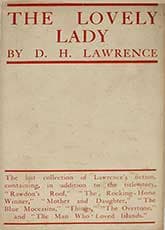The Rocking-Horse Winner
Critique • Quotes
 Collection including "The Rocking-Horse Winner", first edition 1932
Collection including "The Rocking-Horse Winner", first edition 1932First publication
1926 in Harper's Bazaar
First book publication
1932 in collection The Lovely Lady and Other Tales
Literature form
Story
Genres
Literary
Writing language
English
Author's country
England
Length
Approx. 6,000 words
Rockin' the coming of age story
D.H. Lawrence's "The Rocking-Horse Winner" is one of those stories frequently found in school anthologies and taught to English literature students. Or at least it used to be.
For educators, part of the story's classroom appeal may be that it features a child in a quasi-supernatural tale—unlike Lawrence's mainstream novels (Sons and Lovers, Women in Love, Lady Chatterley's Lover), notorious for their realistic adult content.
From a youngster's point of view, it probably also helps that the boy in the story and his kid's toy are endowed with a superpower of sorts, which raises him in the harsh world of parents—fulfilling a yearning that many an adolescent knows.
He's not exactly Spider-Man or Superboy though. There's no joy in his exploits. Rather, his frenzied nursery-room exploits have a sordid quality. He is taken advantage of by adults and grows ever more desperate to prove he is "lucky", as he calls it.
And there is no coming-of-age in this story. In the end his entry into the adult world is tragic. His attempts to direct his strange power to solving his parents' financial problems, and thereby win their love, end up destroying him.
Chilling start
To be fair, "The Rocking-Horse Winner" is not just for children, perhaps not even primarily for children. The story is equally a popular entry in compilations for older folks. Even apart from its theme of youthful angst, "The Rocking-Horse Winner" is often labelled by critics and academics a "perfect story".
The story's opening passage of the mother who doesn't love her offspring—a fact known only to herself and her children—must be chilling for young readers. But it's also rough for parents, possibly because they may experience a small element of recognition.
After this initial shock, "The Rocking-Horse Winner" takes just a dozen or so pages to skilfully combine gritty naturalism with some ambiguous fantasy, and cram in a load of serious matter, including issues of human greed, parental neglect, the nature of luck, exploitation, a critique of materialism, keeping up appearances, the search for love in a cold society, middle-class angst.... Take your pick of essay topics.
But beware, you may find it more difficult than expected to expand upon your chosen themes. For they are never handled in a simplistic way in this story. Lawrence doesn't make it easy to draw to a complete or simple moral, but rather he hints at several possibilities.
This is one of those compact tales that can give you a different range of perspectives each time you read it, especially if you read it at different ages. You may even switch between loving and hating the story in subsequent readings. And that's okay.
— Eric
Critique • Quotes

